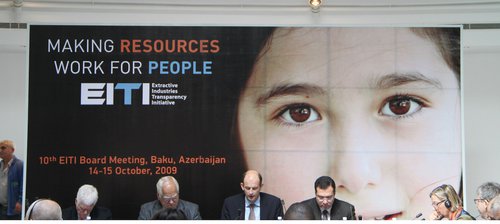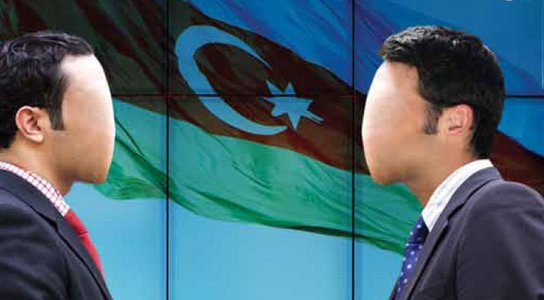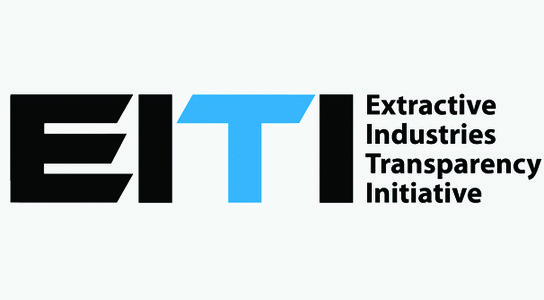Vicious oppression of independent civil society – journalists, opposition politicians, human rights lawyers, dissenting voices – and endemic official corruption are a fact of life for many Azerbaijanis. The evidence for this is not just anecdotal. Global Witness investigations have previously reported on the corruption crippling the country’s oil sector while last week a Human Rights Watch report laid bare how independent civil society in Azerbaijan is struggling to survive.
With all this going on, how is it possible for Azerbaijan to remain a member of a landmark transparency scheme whose founding principle is the freedom of civil society to hold government to account? The Extractive Industries Transparency Initiative (EITI) was founded by civil society to tackle the corruption in the oil gas and mining industries that so stifles fledgling economies like Azerbaijan’s. Civil society oversight is key to how it works – it is the how companies and their government counterparts are held accountable for their management of precious natural resources. Without this watchdog function, the system breaks down – the EITI instead becomes a fig leaf for the corruption it is designed to stop.
The situation in Azerbaijan is doubly frustrating given the scheme’s recent progress on this front. In January 2015, after years of campaigning by NGOs across the globe, the EITI brought in a ground-breaking new standard. The so-called Civil Society Protocol is designed to ensure that civil society is properly protected and able to operate without oppression. It’s so important that in March 2016 the EITI’s governing body decided to safeguard these rules, so all the 51 countries who have signed up to the initiative must abide by them or face automatic suspension[1]. This is important for countries like Azerbaijan who rely on being a member of this transparency club to secure international funding to extract their natural resources.
 So when the Azerbaijani
government started locking up its civil society activists, Global Witness and
its coalition partners from resource rich countries all around the world in Publish What
You Pay called for the EITI to take action. And after immense pressure
they did – in April 2015 in an unprecedented move the EITI
sanctioned one of the oldest members of its club. But fast forward two
years and Azerbaijan was back in the dock. Yesterday, the EITI’s International
Board discussed suspending Azerbaijan from the initiative, which would have
sent shock waves through the international community. But as the political tension
rose, the Azerbaijani Government brought in a last minute,
cosmetic softening of its crackdown on civil society to escape
sanctions. It committed to lifting the repressive legal barriers preventing
civil society from freely operating by February 2017 - for example by eliminating heavy penalties and obligations for NGOs and simplifying regulations on access to funding through
amendments to the Code of Administrative
Offenses, Law on Grant, Law on NGOs and other relevant laws.
So when the Azerbaijani
government started locking up its civil society activists, Global Witness and
its coalition partners from resource rich countries all around the world in Publish What
You Pay called for the EITI to take action. And after immense pressure
they did – in April 2015 in an unprecedented move the EITI
sanctioned one of the oldest members of its club. But fast forward two
years and Azerbaijan was back in the dock. Yesterday, the EITI’s International
Board discussed suspending Azerbaijan from the initiative, which would have
sent shock waves through the international community. But as the political tension
rose, the Azerbaijani Government brought in a last minute,
cosmetic softening of its crackdown on civil society to escape
sanctions. It committed to lifting the repressive legal barriers preventing
civil society from freely operating by February 2017 - for example by eliminating heavy penalties and obligations for NGOs and simplifying regulations on access to funding through
amendments to the Code of Administrative
Offenses, Law on Grant, Law on NGOs and other relevant laws.
Azerbaijan is gaming the system
The problem with all this is that the Azerbaijani Government hasn’t actually done anything to fix the problems yet, but the EITI has let it off the hook. It made a number of paper commitments that it calculated – correctly - would allow it to avoid suspension. But it has already broken the rules, and not yet implemented the necessary reforms so it should have been suspended until it can demonstrate change in practice, not just on paper. Without this red line, there is no deterrent effect.
Influential players in the scheme have let the people of Azerbaijan down. Key members of the EITI’s governing body, including the US Government and key oil and gas companies, failed to uphold the rules and are now calling for the safeguards protecting civil society to be abolished. Their approach airbrushes out a situation that worsens by the day for Azeri civil society.
The EITI has done much to foster collaboration between civil society, governments and companies – this has driven transparency up the global agenda and enabled citizens all over the world to engage with debates on the management of their natural resources. In Azerbaijan, that legacy is now on the line, and the course of action should be clear. If the Azerbaijani Government does not stop oppressing its civil society they must face the consequences, and lose the access and good PR it gets from membership of the scheme.
Global Witness will be carefully watching the Azerbaijani Government over the next three months to ensure that it implements the corrective actions it has committed to introducing by February 2017 which would ensure independent civil society is free from fear and persecution.
[1] See EITI2016 Standard, 8.3 c) https://eiti.org/node/4922#r1-3


